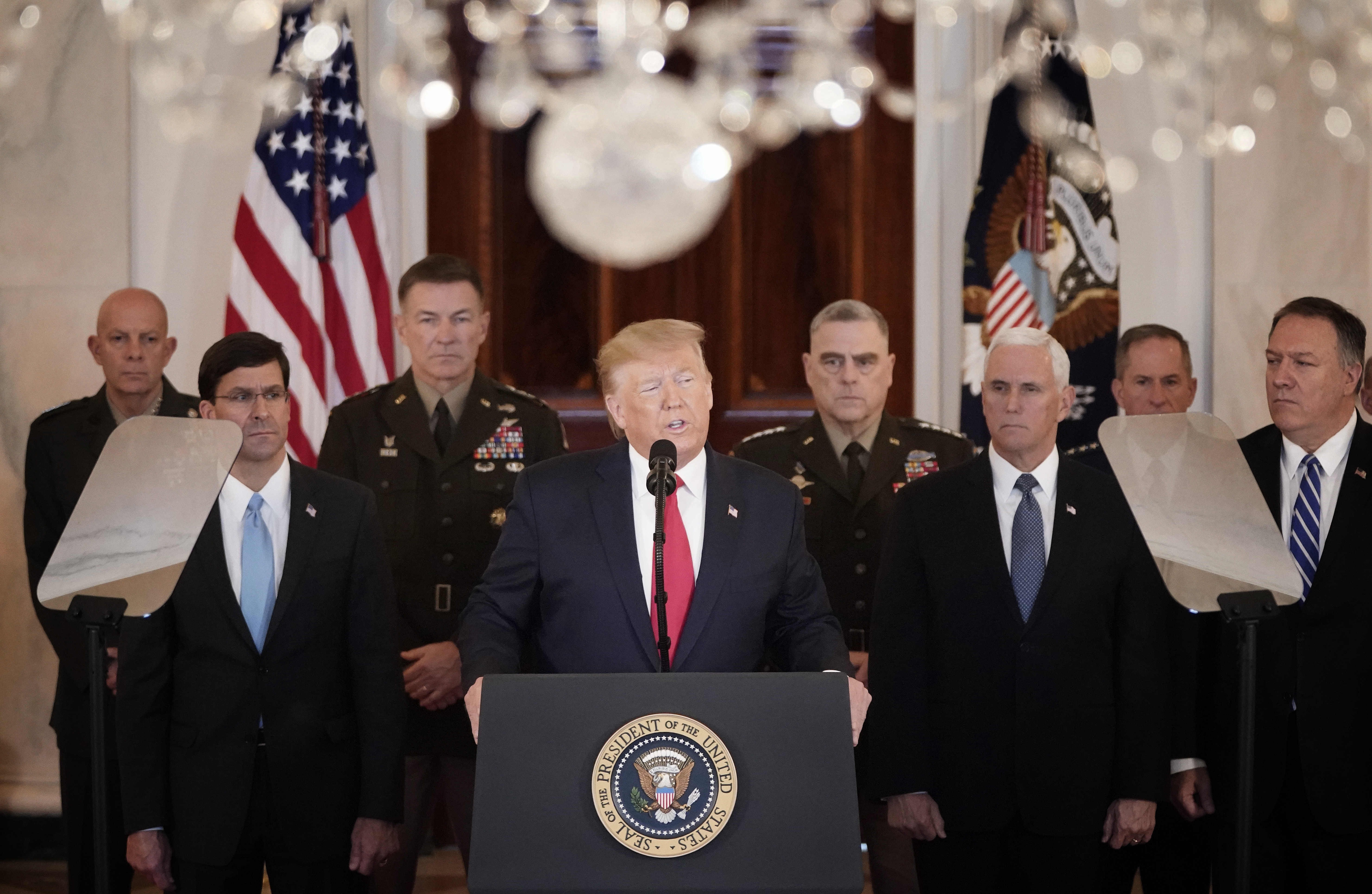Have the US and Iran stepped back from the brink of war?
Iran's response to the assassination of General Qasem Soleimani was measured and has been met with a conciliatory response from Washington


A free daily email with the biggest news stories of the day – and the best features from TheWeek.com
You are now subscribed
Your newsletter sign-up was successful
From the moment news of Qasem Soleimani’s death at the hands of the US broke last Wednesday, the world has waited anxiously for the inevitable Iranian response.
It came in the early hours of yesterday morning - 22 missiles from Iranian territory hit Al Asad, an air base in the desert of western Iraq, and a second air base in Irbil, the capital of Iraqi Kurdistan.
As an event, it is significant - the first time Iran has directly attacked the US military since the clerical government rose to power in 1979 - but at the same time it killed nobody.
The Week
Escape your echo chamber. Get the facts behind the news, plus analysis from multiple perspectives.

Sign up for The Week's Free Newsletters
From our morning news briefing to a weekly Good News Newsletter, get the best of The Week delivered directly to your inbox.
From our morning news briefing to a weekly Good News Newsletter, get the best of The Week delivered directly to your inbox.
In this way, the attack seems to have been calibrated precisely in line with Iranian interests. The government in Tehran gave a direct and symbolically powerful response to the assasination of their most celebrated hero, while taking care to define their actions as “proportional” - hoping for a degree of support within the international community, and softening tempers in Washington.
Tehran knows an all-out war with the US would lead to the decapitation of the regime, so clearly does not serve their interests.
Iraqi Prime Minister Adel Abdul-Mahdi said Iran gave warning in advance of the attack, meaning US and Iraqi soldiers had time to seek shelter. US intelligence knew about the upcoming attack hours in advance, and the missiles didn’t hit areas where troops were located.
“Had they killed US troops, we’d likely be headed to war,” said Afshon Ostovar, assistant professor of national security affairs at the Naval Postgraduate School. “But they telegraphed their move, giving us and the Iraqis ample time to move troops to cover. That suggests it was measured, intentionally limited and perhaps intentionally nonlethal.”
A free daily email with the biggest news stories of the day – and the best features from TheWeek.com
It seems, for now at least, the two nations are no longer at the brink of war.
“Iran appears to be standing down, which is a good thing for all parties concerned and a very good thing for the world,” said President Donald Trump in a televised address from the White House yesterday, flanked by senior government officials and military officers in uniform. “The United States is ready to embrace peace with all who seek it.”
“Iran took & concluded proportionate measures in self-defence,” Iranian Foreign Minister Mohammed Javad Zarif said in a tweet. “We do not seek escalation or war, but will defend ourselves against any aggression.”
“At this point, the Iranians feel they have sent a message that they want to preserve their face in light of what’s happened, and they feel they have restored deterrence,” said Kamel Wazne, a political analyst in Beirut.
However, while the regime is realistic about their prospects in a direct confrontation with the US, indignation at the killing of Soleimani is real in Tehran, and some analysts predict that hard-liners will be pressing for a more lethal reaction.
This will likely take the form of more asymmetric, deniable attacks, undertaken by any of the numerous Iranian proxy groups in the region.
According to The New York Times, the messages of restraint coming from Tehran “did not mean Iran was done maneuvering. More broadly, Iran has remained focused on the goal of forcing the expulsion of United States troops from Iraq.”
“You cut off the hand of Qasem Soleimani from his body, and we will cut off your feet from the region,” said Iranian President Hassan Rouhani in his meeting with the country’s Council of Ministers yesterday morning, in reference to the fact Soleimani’s hand was severed when he was killed in Baghdad.
–––––––––––––––––––––––––––––––For a round-up of the most important stories from around the world - and a concise, refreshing and balanced take on the week’s news agenda - try The Week magazine. Get your first six issues free–––––––––––––––––––––––––––––––
There is a tension in US policy, too. On one hand, Trump campaigns for a reduction of US involvement and responsibility in foreign theatres, and on the other, his “maximum pressure” approach to Iran is defined by a confrontational strategy that promises extreme consequences for any aggression.
“This glitch is not in the temperament of one man, but in the whole idea of America First, of nativism everywhere,” argues Jana Ganesh in The Financial Times. “It can have its chest-beating sense of honour or it can have its dream of a quiet life in a world of sovereign states minding their affairs. Having both seems fantastic, as the first will tend to compromise the second.”
Given neither nation wants war, it is likely that both will continue to find ways to avoid it. Wednesday is evidence of this. However, given the Trump administration’s confrontational approach, and Iran’s plans for regional influence, friction between the US and Iran will continue.
“This round is over, but tension remains high, and conflict could be ignited any moment by incidents that inflict US casualties by Iranian proxies,” said Riad Kahwaji, who heads the Inegma defence consultancy based in Dubai.
William Gritten is a London-born, New York-based strategist and writer focusing on politics and international affairs.
-
 How the FCC’s ‘equal time’ rule works
How the FCC’s ‘equal time’ rule worksIn the Spotlight The law is at the heart of the Colbert-CBS conflict
-
 What is the endgame in the DHS shutdown?
What is the endgame in the DHS shutdown?Today’s Big Question Democrats want to rein in ICE’s immigration crackdown
-
 ‘Poor time management isn’t just an inconvenience’
‘Poor time management isn’t just an inconvenience’Instant Opinion Opinion, comment and editorials of the day
-
 Munich Security Conference: a showdown between Europe and Trump?
Munich Security Conference: a showdown between Europe and Trump?Today’s Big Question Report suggests European leaders believe they can no longer rely on the US for military support – but decoupling is easier said than done
-
 New START: the final US-Russia nuclear treaty about to expire
New START: the final US-Russia nuclear treaty about to expireThe Explainer The last agreement between Washington and Moscow expires within weeks
-
 Would Europe defend Greenland from US aggression?
Would Europe defend Greenland from US aggression?Today’s Big Question ‘Mildness’ of EU pushback against Trump provocation ‘illustrates the bind Europe finds itself in’
-
 Greenland, Colombia, Cuba: where is Donald Trump eyeing up next?
Greenland, Colombia, Cuba: where is Donald Trump eyeing up next?Today's Big Question Ousting Venezuela’s leader could embolden the US administration to exert its dominance elsewhere
-
 Did Trump just end the US-Europe alliance?
Did Trump just end the US-Europe alliance?Today's Big Question New US national security policy drops ‘grenade’ on Europe and should serve as ‘the mother of all wake-up calls’
-
 Trump peace deal: an offer Zelenskyy can’t refuse?
Trump peace deal: an offer Zelenskyy can’t refuse?Today’s Big Question ‘Unpalatable’ US plan may strengthen embattled Ukrainian president at home
-
 Vladimir Putin’s ‘nuclear tsunami’ missile
Vladimir Putin’s ‘nuclear tsunami’ missileThe Explainer Russian president has boasted that there is no way to intercept the new weapon
-
 Russia’s war games and the threat to Nato
Russia’s war games and the threat to NatoIn depth Incursion into Poland and Zapad 2025 exercises seen as a test for Europe
